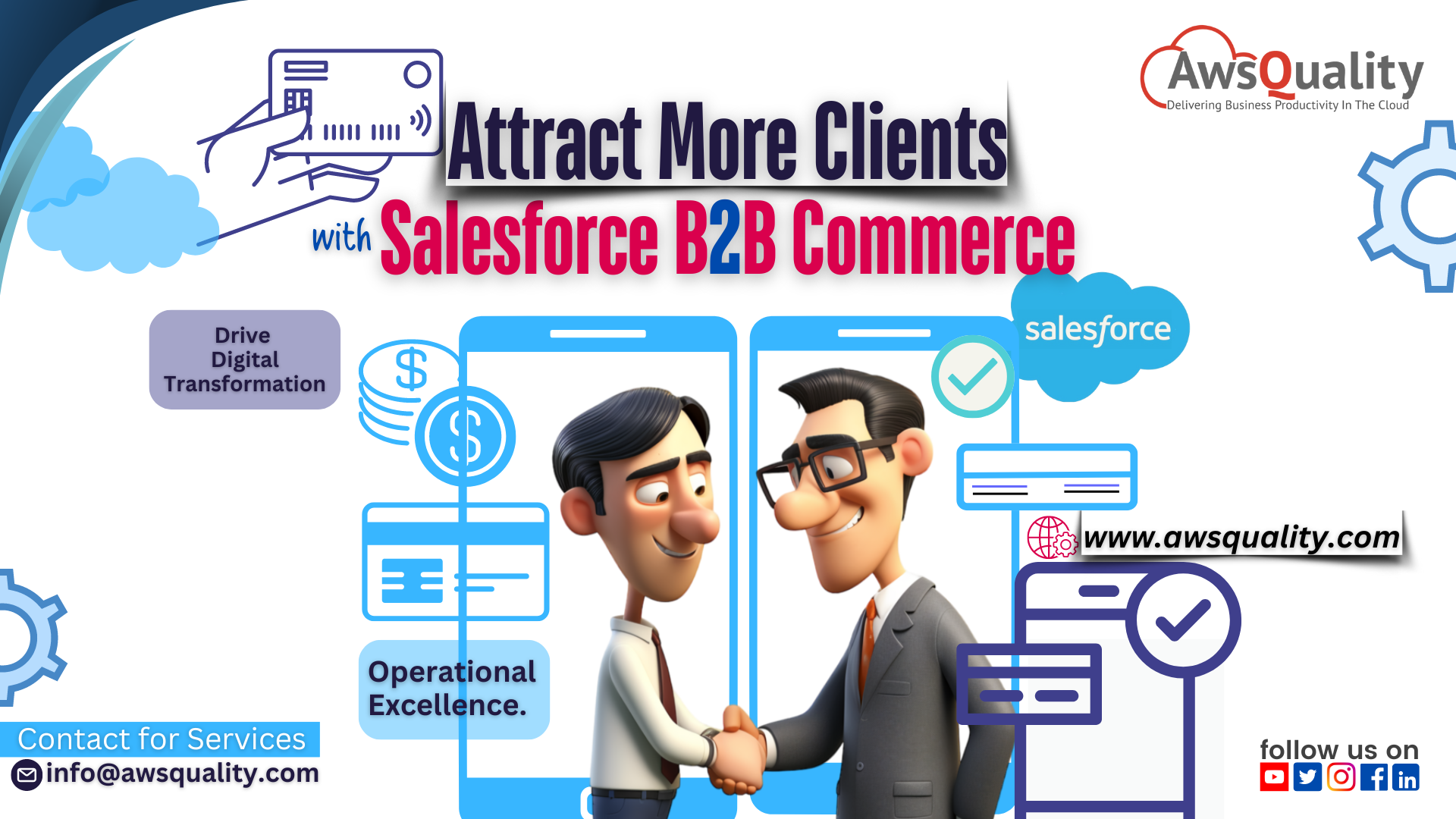
Explore how Salesforce B2B Commerce and expert consulting from AwsQuality drive digital transformation and operational excellence.
The modern e-commerce world is growing rapidly as you can see B2B ecommerce market worth over $12 trillion worldwide. The growth is driven by globalization especially in Asia, mobile optimization and marketing personalization across the globe, social commerce triumphing over traditional ecommerce platforms among others(sv) Automation and efficiency is the go-to; detailed information yields high sales. Its distinct ability to create digital storefronts, AI-powered analytics that streamline processes and seamless CRM integration make it stand out. Salesforce solutions have improved revenues and operational efficiencies for large clients both consumer discretionary, industrials. Salesforce consulting services facilitate experts who are adept in leveraging these innovations for companies trying to pursue innovative digital transformation.
B2B Ecommerce: What Is It?
Direct selling of products and services from one company to another can be termed as b2b e-commerce. B2Bs are transaction that occur between two entities; for example, manufacturer to wholesaler or wholesaler to retailer unlike B2C business model where a company is selling directly me (a consumer) These transactions are made through online sales portals that simplify procedures, reduce costs and increase productivity. The global B2B e-commerce industry is a major market opportunity, worth an estimated $12 trillion or more. If you are considering entering B2B e-commerce, then ‘Well done!
Elaborate on the B2B e-commerce market’s growth tendencies.
The following major trends have been driving the enormous expansion of the B2B ecommerce market:
Worldwide Development:
- The gross merchandise volume (GMV) of worldwide B2B e-commerce increased by 20.5% in 2022 to $22.172 trillion.
- In 2020–2021, the global B2B GMV increased by a remarkable 23.7%.
Asia and the Pacific Lead:
- With a remarkable 78% of the worldwide GMV, Asia is the hub of B2B e-commerce.
- The region leads in B2B trade in part because of its strong digital infrastructure and vibrant business ecosystems.
Optimizing for Mobile:
- In business-to-business transactions, mobile devices are essential. Success requires optimizing mobile experiences.
- Companies need to guarantee easy access to their goods and services via mobile devices.
Social Business:
- B2B sales are increasingly dependent on social media channels. Using social media platforms gives potential customers more purchasing choices.
- Through social media engagement, brands may build relationships with potential customers and increase conversion rates.
Customization:
- Personalized online buying experiences are what B2B customers demand. Customizing content and recommendations improves consumer happiness.
- Meeting client expectations requires data-driven personalization.
Multichannel Strategy:
- Omnichannel strategies are being used by B2B firms. Consistent client experiences are ensured via seamless channel integration.
- Consumers can interact with companies on a variety of platforms, such as mobile apps and websites.
Efficiency and Automation:
- E-commerce solutions increase accuracy and efficiency by automating sales procedures.
- Optimizing inventory tracking, order management, and customer service improves performance as a whole.
Product Discovery Information:
- Having access to thorough product data is essential. To make wise judgments, buyers depend on comprehensive information.
- Successful B2B sales are fueled by detailed product specifications, photos, and descriptions.
Remember that companies hoping to succeed in the ever-changing world of B2B e-commerce must stay on top of these trends.
B2B salesforce commerce
Salesforce B2B Commerce caters to businesses that conduct a lot of online business-to-business (B2B) transactions. Here are some salient features about it:
Develop B2B E-Commerce:
- Businesses may design e-commerce storefronts just for B2B clients with Salesforce B2B Commerce.
- These storefronts give suppliers simple internet access, making it possible for B2B customers to make effective product purchases for their company’s requirements.
Characteristics and Advantages:
- Digital Storefronts: Choose from a range of digital storefront themes, fully headless commerce, or a hybrid approach to meet your business objectives.
- Trade AI for Retailers: Give your teams conversational AI to manage anything from shop setup to expansion.
- Business Analytics Driven by Data Cloud: Use AI insights and sophisticated merchant dashboards to optimize your business.
- Personalization at Scale: Improve online purchasing experiences with artificial intelligence and real-time data.
- Deliver individualized experiences across media, from WhatsApp to the metaverse, to increase customer acquisition and loyalty.
- CRM Embedded Commerce Apps: Include digital commerce into your channels for marketing, sales, and customer service.
- Order Management: For clear deliveries and top-notch service, streamline dispersed order management.
- High Uptime: Salesforce has a 99.99% historical uptime rate and facilitates commerce for over two billion shoppers.
- Revenue Growth: By switching from historical channels to digital channels, customers reported a 29% increase in revenue.
Acknowledgment from Gartner:
- For eight years running, Salesforce has ranked first in the Gartner Magic Quadrant for Digital Commerce.
You can visit the official Salesforce B2B Commerce page for pricing and more resources, or you can explore the Salesforce B2B Commerce Trailhead module for more in-depth information.
Which Salesforce B2B Commerce use cases are effective?
Below are a some instances of Salesforce B2B Commerce that have been successful:
-
Digital Transformation for a Manufacturer of Industrial Products:
- Client: A well-known industrial products company with headquarters in the US that brings in more than $4 billion annually.
- Challenge: Outdated backend systems, insufficient front-end apps, and data silos were among the legacy systems and procedures that hampered the client experience.
- Solution: PwC added bespoke functionality to Salesforce B2B Commerce with 12 integrations (including Transplace, Oracle, and PIM). The new platform offered real-time information, enhanced self-service, and expedited ordering.
-
Streamlining B2B Transactions:
- Efficient management of orders, inventories, and distribution is facilitated by B2B commerce.
- enables sales teams to concentrate on closing deals and obtain insights from real-time client data by automating repetitive operations.
Recall that Salesforce B2B Commerce gives companies the ability to provide intelligent digital interaction, personalized online ordering, and improved B2B customer experiences.
Which are the most important Salesforce B2B Commerce connections available?
To improve the user experience overall, Salesforce B2B Commerce interfaces with a variety of services and platforms with ease. Here are some essential points of integration:
Extensions for Commerce:
- Salesforce debuted Commerce extensions for pricing, inventory, shipping, taxes, and other services in the Winter ’24 release.
- These extensions provide fine-grained control over storefront functionality, hence providing flexibility and customization options.
CRM Integration:
- Salesforce Integration CRM makes ensuring that consumer interactions are seen holistically.
- Through the use of AI capabilities and data-driven insights, it improves the consumer experience.
Payment Gateways:
- For safe transactions, B2B commerce offers a number of different payment gateways.
- Examine your options and choose the one that best fits your company’s requirements.
Custom B2B Checkout Integrations:
- Configure B2B checkout flows with custom integrations to customize the process to your unique needs.
Recall that these connectors enable companies to provide outstanding B2B commerce experiences, automate growth, and optimize procedures.
In conclusion,
Trends like the expansion of the global market, mobile optimization, and social commerce are propelling the fast growth of the B2B e-commerce industry. Salesforce B2B Commerce provides organizations with sophisticated tools to build customized digital storefronts, improve operations with AI-powered analytics, and interface with CRM systems with ease. For clients, these capabilities have been shown to boost revenue and operational effectiveness. Using Salesforce consulting services from AwsQuality may give companies looking to succeed in the digital market the know-how and resources they need to successfully negotiate and prosper in the changing B2B e-commerce environment.




